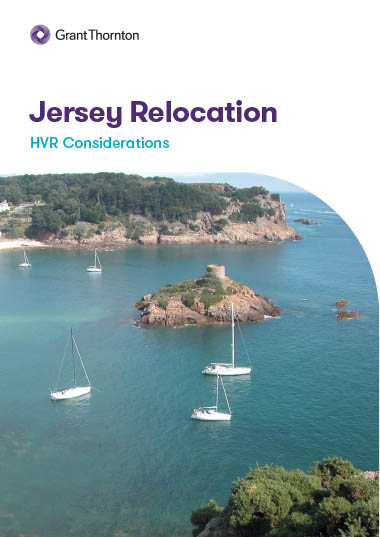
Living and working in Jersey
-
Jersey controls its population by restricting access to housing & employment.
-
New arrivals to the island, with no existing links to the island, will need to consider adopting either ‘entitled’, ‘licensed’ or ‘registered’ status.
-
‘Registered’ individuals have a heavily restricted choice of accommodation, and employers will require express permission from the Population Office to employ them.
-
‘Licensed’ individuals have largely unrestricted access to the housing market, but on the condition that they retain a ‘job that can only be undertaken by Licensed persons”. In practise, the individual will need to maintain their licensed status for a period of 10 years before they become entitled.
-
‘Entitled’ individuals can live and work in Jersey without restriction, however for an individual to arrive with entitled status they will require approval under the ‘High Value Residents’ (“HVR”) scheme, which includes a current minimum charge to income tax of £250k.
Taxation
-
The year of assessment in Jersey is the calendar year.
-
Ordinarily resident individuals will generally be liable to income tax on their worldwide income from the date of arrival.
-
When a person takes up residence in Jersey for the first time, there are also special rules concerning the income that needs to be declared in that first year.
-
The standard rate of tax in Jersey is 20%.
-
Jersey companies are generally taxed at 0% - however regulated entities and certain other entities are taxed at 10% or 20%.
-
There is no capital gains tax in Jersey and no tax is levied on gifts or an individual’s net worth.
-
There are virtually no estate or death duties (see below re: probate).
-
There is a double tax treaty between Jersey and the UK which relieves most forms of double taxation.
-
Jersey has few other treaties, so if taxes are payable in certain other countries, then it is unlikely that double tax relief will be due. However, foreign tax can be expensed against income chargeable in Jersey.
HVR Tax Regime
-
Individuals arriving in Jersey as an approved HVR are required to make an annual income tax contribution of £250k (index linked).
-
In theory, this requires annual chargeable income of £1.25m. However, Jersey legislation provides for notional ‘top-up’ income to be included in an HVR’s assessment if their chargeable income does not meet this threshold. This ensures that at least £250k is payable every year.
-
This minimum charge to income tax is not pro-rated in the year of arrival / departure.
-
Any income in excess of the £1.25m threshold will be liable to tax at a preferential rate of 1%.
Social Security
-
The Island has a compulsory social security scheme. Everyone between school leaving age and pension age is insurable under either Class 1 (covering employed individuals), or Class 2 (those not in Class 1, that is, self-employed or unemployed individuals). Please note if resident in Jersey, then there should be no National Insurance due in the UK under a bilateral reciprocal agreement.
-
Social Security have to be informed of arrival etc. for health purposes - Spouses may also be liable - this is age dependent for both parties.
Long-Term Care
Jersey also operates a scheme known as ‘Long-Term Care’ (“LTC”). LTC is currently calculated at 1.5% (2024) of your total income up to an upper Earnings limit – this is in addition to the minimum tax number & social security. The maximum LTC charge for year of assessment 2024 is £4,473.
VAT/GST
-
Jersey is not a member state of the European Union and is not obliged to adopt its directives on direct or indirect taxation and therefore VAT is not applicable in Jersey. However, Jersey has introduced a form of Goods and Services Tax (“GST”) at a rate of 5%. The registration threshold is £300,000 and is chargeable on most items.
-
No GST should apply to any items that an applicant brings from their existing residence (there are special rules around certain items such as cars / wine / cigars etc.)
Probate duty
-
Jersey has probate duty, though very small.
-
For individuals who are domiciled in Jersey at the date of death the world-wide estate is liable. Otherwise, only assets situated in Jersey are liable.
-
Probate duty is capped at £100,000.
Stamp duty
Stamp duty at rates of up to 10.5% may be levied on the acquisition of property in Jersey.
Family members
-
Spouses are included under the single housing consent in that they would have “entitled to work” status. However, Jersey recently introduced independent taxation, and spouses are now considered distinct and separate for the purposes of charging income tax. i.e. a Jersey resident spouse would still be liable at normal tax rates on their worldwide income irrespective of whether their spouse is residing in Jersey as an HVR or not. Planning may be needed to minimise the impact of independent taxation on the family unit;
-
No automatic residential rights would be given to any children – though there are different rules depending on how old they are.
Licencing insights
As Jersey essentially controls its population through its Housing Laws, this has an impact on the tax status of people coming to the island and the type of accommodation they can occupy.
For example, it normally takes 10 years of residence before a person can buy a property here and achieve “Entitled” status.
However, the Population Office have the ability to grant permission to certain people (who do not fulfil the 10-year residency requirement) to reside on the Island on the basis that granting such a permission would have social or economic benefits or would in general be in the best interests of the Island (HVRs).
In general terms a person who has no links to Jersey has basically three different housing categories / options that relate to taking up residence in Jersey.
-
Registered Consent
-
Essentially Employed Licence
-
Entitled - HVR
“Registered” Consent
The “registered route” is quite restrictive, and it is anticipated that it would not meet your requirements as the stock of available residential properties is very limited, expensive, and also involves administrative hoops if a person wanted to work on the Island.
If further information is required in relation to this route, please contact us.
“Essentially Employed” Licence
The alternative to the HVR route is to obtain a licence to live on the island. These have greater benefits than the registered route in that a person has access to better housing and employment and the tax payable can be less than the HVR route.
The essentially employed route is not as flexible as it basically means that the applicant would have to carry on working full time for the next 10 years. The Essentially Employed licence is intrinsically linked to employment so if that employment ceased, the Population Office could ask the applicant to vacate that property within 3 months if another equivalent Essentially Employed position was not available. If further information is required in relation to this route, please contact us.
Entitled - High Value Resident (“HVR”)
The HVR regime is available by application only. The applicant will need to supply certain Information to the Jersey Authorities and demonstrate that the required criteria is met.
The HVR regime is the most flexible route to take up resident in the Island.
Jersey will still expect the applicant to contribute to the island, so the tax payment, though important, is not the only criteria.
Application insights
Under the Jersey law one is able to obtain ‘entitled’ status without the 10-year qualifying period where it can be justified that the consent has been granted:
-
on social or economic grounds or both, and
-
as being in the best interests of the community
The following factors will be taken into account when applications are considered for ‘entitled’ status:
-
the individual’s contribution to tax revenues are in excess of (currently) £250,000 per annum i.e. £1.25m @ 20% (This is subject to inflation upon a 5 yearly review) - the tax is basically calculated as £1.25m @ 20% and then any excess at 1% (there are some exceptions, such as Jersey rental income and Jersey taxed at source dividends);
-
the background of the applicant and the associated benefit that could arise for Jersey as a result of the taking up of residence in the Island;
-
any other general benefits which the Island may obtain if the applicant takes up residence in the Island;
-
applicants will normally be required to demonstrate that they have sufficient wealth so that, at the present rate of tax, their annual contribution is at least £250k. However, if they do not meet the required income levels (because they live on capital etc.) then the £250k turns into a fee (not necessarily beneficial if looking at double tax credits);
-
if HVR status is granted there is a one-off charge in order to obtain a registration card. They will need to obtain this card in order to transact a property or commence employment on the Island; and
-
it is expected that an applicant will have net assets in excess of £15m, which will need to be demonstrated to Revenue Jersey as part of the application
If a person comes as an HVR individual, then it has to be demonstrated that there is clear benefit to the island of them being here, wider than just the annual tax contribution. Other social and economic factors will also be taken into consideration. Only a select number of consents are
granted each year.
Other than tax contributions, aspects of an application that the Government may take into account include:
-
voluntary work or business contribution to local community;
-
any training or sporting initiatives particularly aimed at youth or educational organisations;
-
the nature of any actual or potential media coverage of any activities either by, or involving the applicant, both in his business or social life. This to include negative images relating to past business practice, and positive images such as sporting or educational achievements;
-
any cultural interests or skills that have benefited the local community which would be likely to of similar benefit to the Island;
-
general lifestyle and family circumstances, including past charitable work and contributions; and
-
any clear undesirable factors in an applicant’s background, such as a criminal record.
In order to determine whether you have the correct tax profile, the Comptroller of Taxes will look for:
-
how much income would they have that would still be subject to double taxation relief under any double taxation arrangements if they were to take up residency in Jersey?;
-
how much income would they have and would continue to receive which would not be subject to double taxation were they to take up residency in Jersey?;
-
is it the intention to realise or liquidate any assets to ensure that income streams are created to ensure a significant Jersey tax liability?;
-
details of any business interests that you have which are currently managed and controlled elsewhere;
-
a statement of net wealth outlining all assets and liabilities;
-
the applicant would be required to submit financial statements (and tax computations if available) in relation to currently owned companies for the last three years (if applicable); and
-
copies of personal and corporate income tax returns for yourself and any companies for the last three years.
As for the application itself - besides covering the above, the applicant would also need to provide:
Personal letter of application - this is a “why Jersey” letter which should outline all of the reasons that you wish to relocate to the island - e.g. friends / lifestyle / climate / safety / connectivity etc.
-
Business profile of applicant - a brief CV of how the applicant has made their wealth;
-
2 x Personal references;
-
2 x Business references;
-
Verified copy of a current Passport;
-
A Disclosure Certificate from the Disclosure & Barring Service (DBS) formerly known as a CRB Certificate - see https://www.gov.uk/request-copy-criminal-record
In relation to the applicant’s profile, the worldwide income must be disclosed to the Comptroller of Taxes.
Please note that the following should also be considered:
- it does not matter when you arrive, the full £250k is payable. The Jersey tax year is the calendar year so the minimum £250k applies whether you arrive in March or November, for example.
- the level of the expected annual minimum income tax contribution will be reviewed on a regular basis so as to ensure the tax contribution made by HVRs retains its value over time. It is proposed that the review will take place every 5 years.
- it is expected that the £1.25m will rise by inflation at every review – next review c. 2028.
- as mentioned above, if a HVR has insufficient income (for example due to change in circumstances, fluctuating business profits, capital receipts) to meet their expected annual minimum income tax liability, they will be deemed to receive income to ensure that their tax liability is a minimum £250,000.
- the position of a spouse in the context of the HVR regime is not specifically legislated for; however, we have historically received comfort from the Population Office that should the HVR become deceased that their HVR status would pass to the spouse should they so wish. The spouse does not fall under the same tax regime and is technically liable at 20% on her worldwide income. Some planning may need to be undertaken should the applicants spouse have significant income in their own right.
Additional information
The Government is looking for benefits broader than simply tax. Jersey strives to maintain high professional standards as a reputable IFC, and will seek to ensure that the applicant will positively contribute to it’s international reputation.
It should be noted that Jersey has enforceable inheritance legislation (called “legitime”) that can be claimed if the HVR dies in Jersey. These must be claimed and are not automatic, so for most estates everything simply passes under the Will unchallenged. Legitime tends to only be relevant if the HVR has a complex personal life.
There are additional first-year tax and associated government costs for a successful applicant, and it is estimated that the minimum overall contribution would be c. £270k in year one, with subsequent years being c. £265k.
If other persons needed to come to Jersey with the applicant - extended relatives, domestic staff etc. then please contact us as there are additional restrictions and administrative requirements that need to be adhered to.
Please note that should an application be successful; the Population Office and Revenue Jersey can be flexible around the proposed date upon which the applicant takes up residence. However, it is important to be mindful and keep an open dialogue with both departments surrounding the date which the applicant actually propose to take up residence on the Island.


